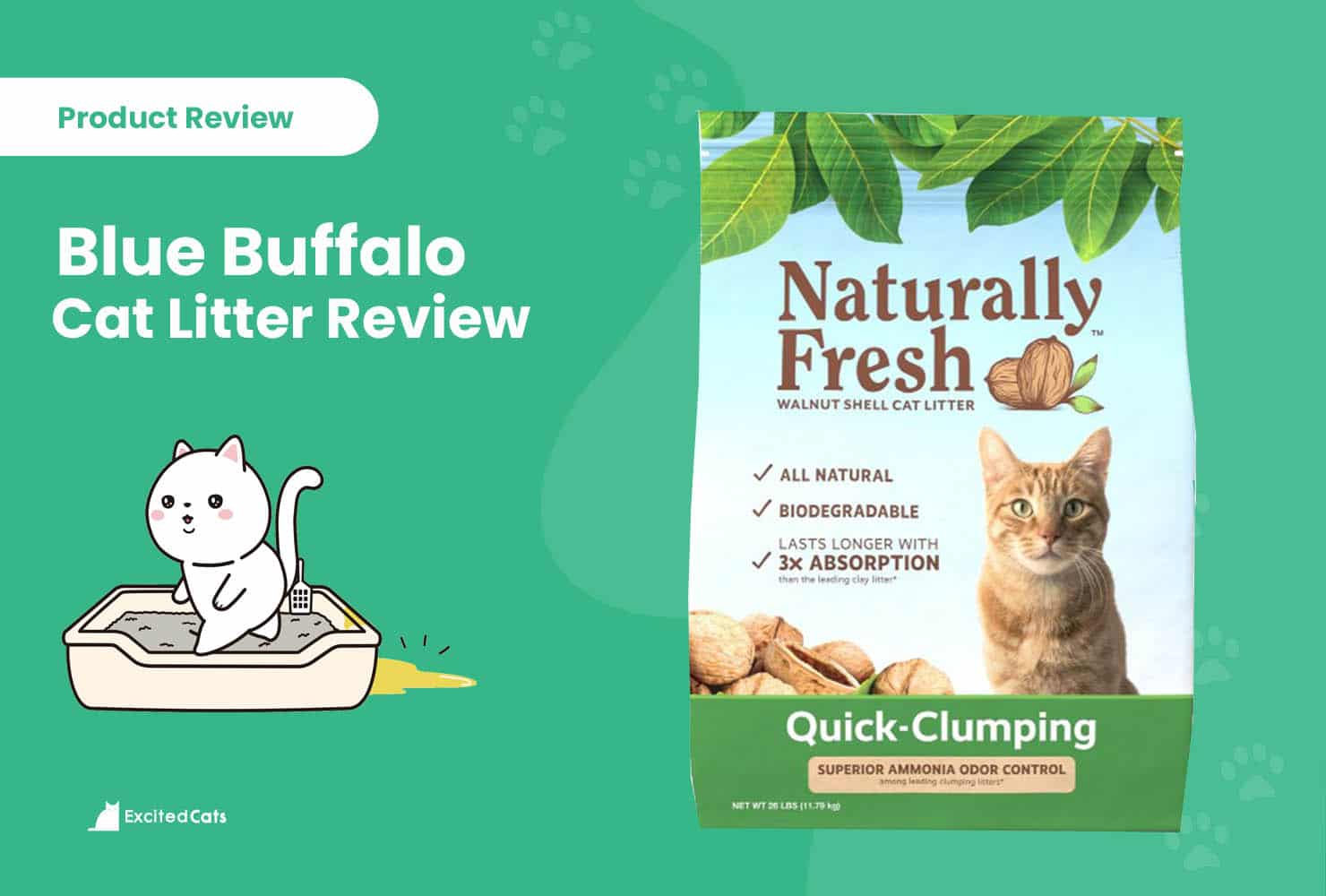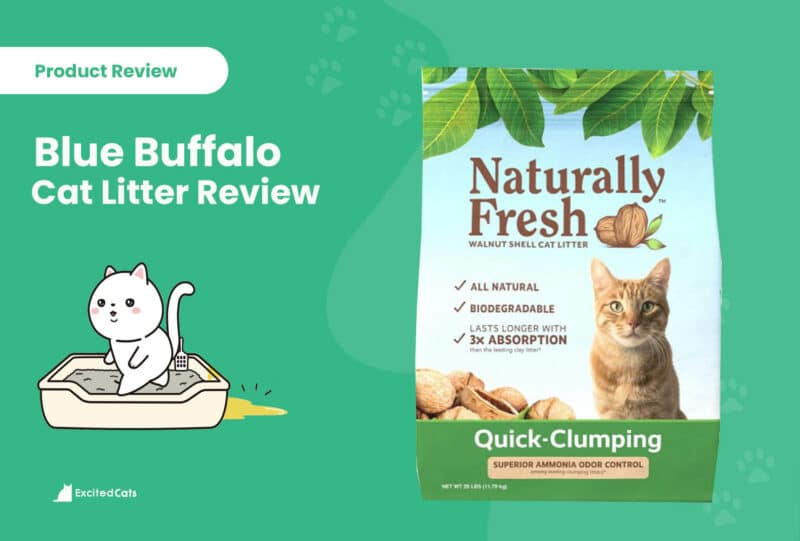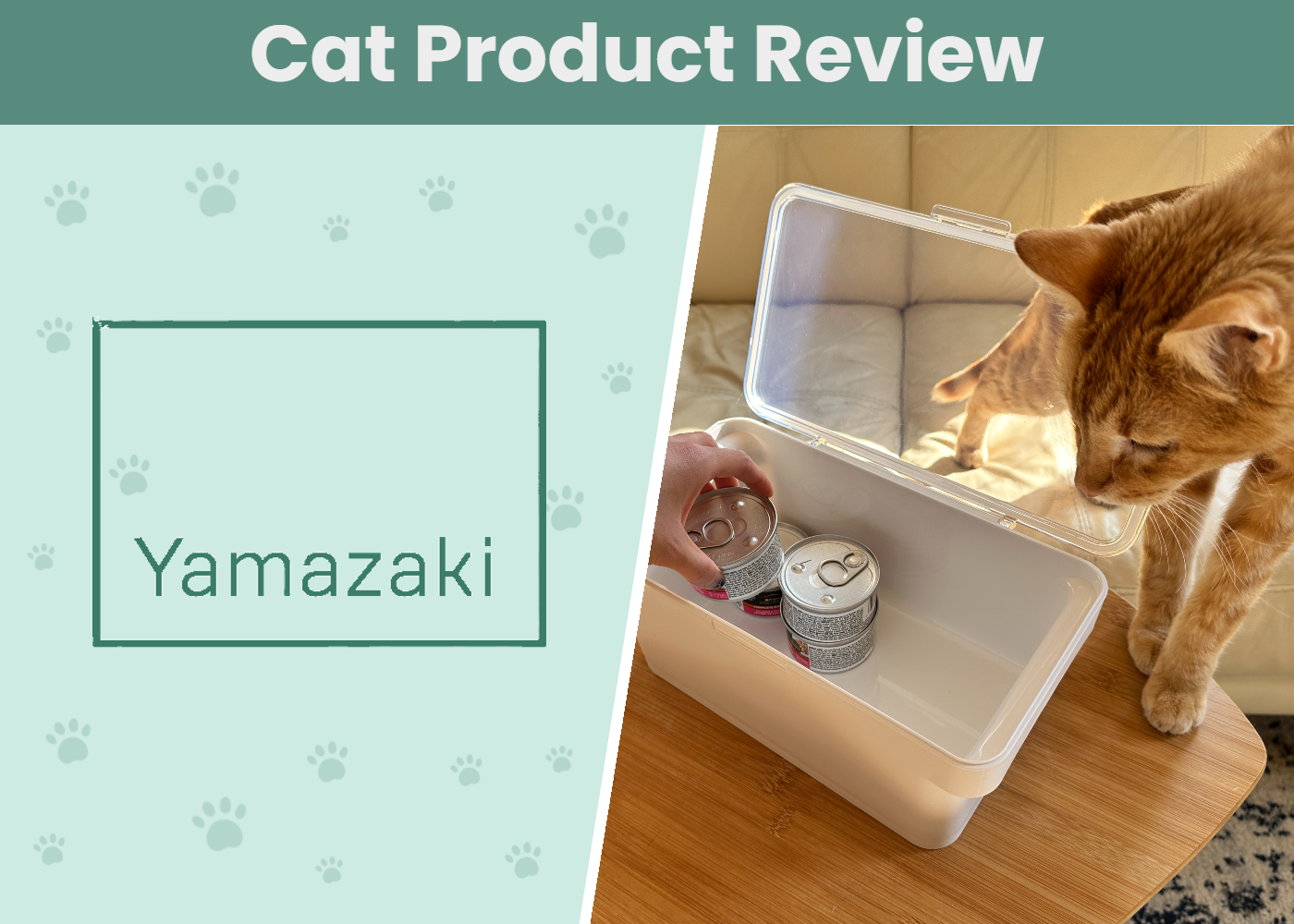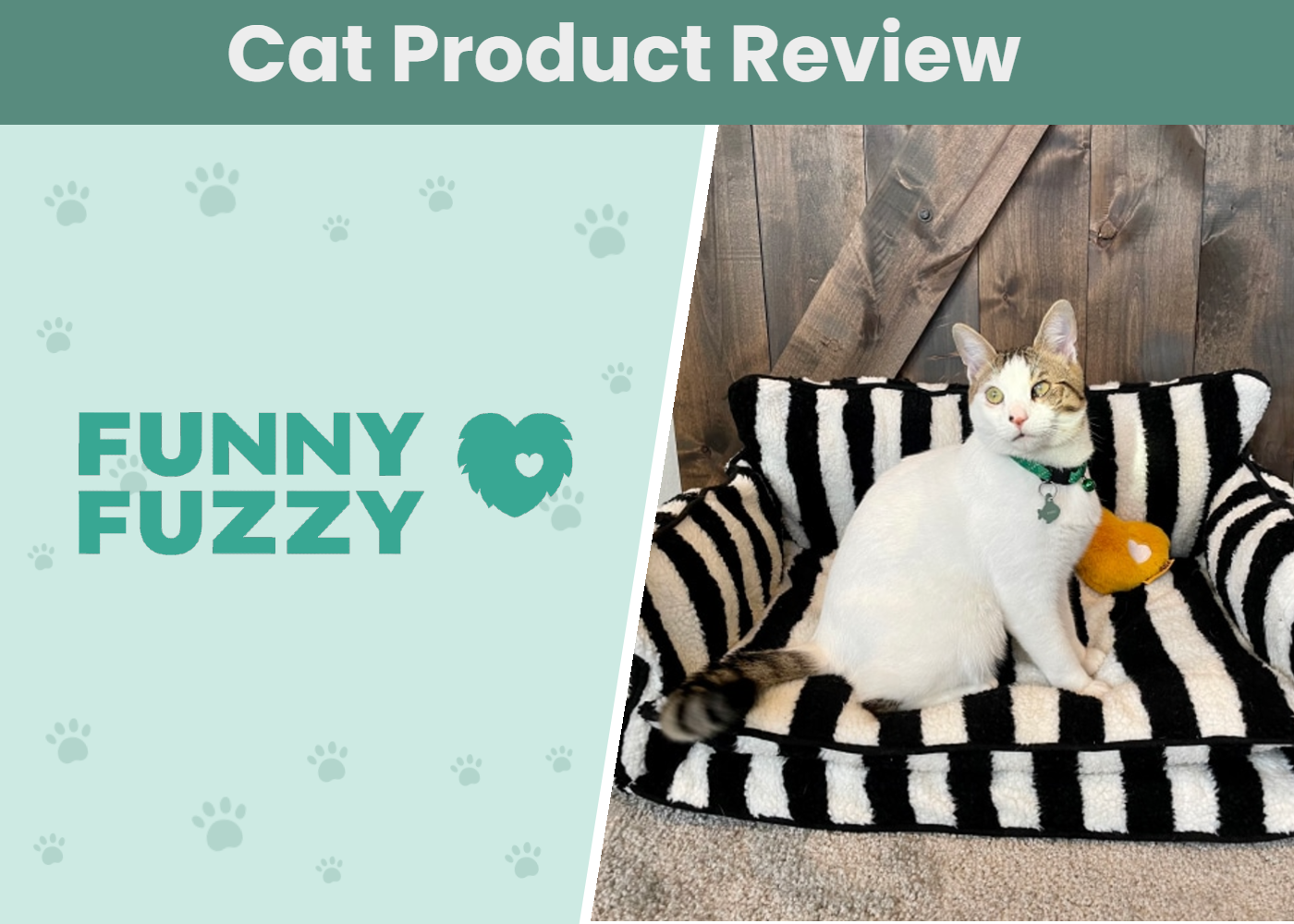We give Blue Buffalo cat litter a rating of 4.1 out of 5 stars.
Review Summary
Blue Buffalo is a brand known for its natural ingredients and health-boosting recipes. They’re the brand that many American pet owners turn to when they lose faith in the over-commercialized products available at big box stores. As a healthier alternative to those low-quality products, Blue Buffalo is a bit more expensive. It used to require a trip to a specialty pet store to find Blue Buffalo, but they’ve been growing in popularity, and now, you can find their products in major chains and big box stores.
If you search for Blue Buffalo cat litter, you might be momentarily confused as there is no cat litter marketed under the name of Blue Buffalo. That’s because it goes by the name of Naturally Fresh instead. But if you look closely, you’ll find the small logo of a little blue buffalo right above the Naturally Fresh label. Their cat litter is made from all-natural materials that are environmentally friendly, continuing the Blue Buffalo tradition of healthy and natural pet products.
At a Glance: The Best Blue Buffalo Cat Litter Formulas:
| Image | Product | Details | ||
|---|---|---|---|---|
| Our favorite |
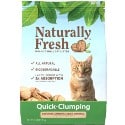
|
Naturally Fresh Unscented Quick-Clumping Walnut Cat Litter |
|
CHECK PRICE |
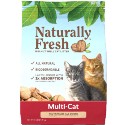
|
Naturally Fresh Multi-Cat Unscented Clumping Walnut Cat Litter |
|
CHECK PRICE | |
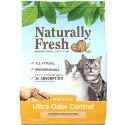
|
Naturally Fresh Multi-Cat Odor Control Clumping Cat Litter |
|
CHECK PRICE | |
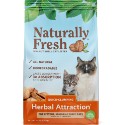
|
Naturally Fresh Herbal Attraction Scented Clumping Walnut Cat Litter |
|
CHECK PRICE | |
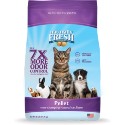
|
Naturally Fresh Pellet Unscented Non-Clumping Walnut Cat Litter |
|
CHECK PRICE |
Blue Buffalo Cat Litter Reviewed
Blue Buffalo produces high-quality cat litter under the name of Naturally Fresh. Several different varieties are available, all of which are made from walnut rather than clay or other common materials. Cat litter from Blue Buffalo is all-natural and biodegradable, offering a safe and eco-friendly alternative to traditional cat litters.
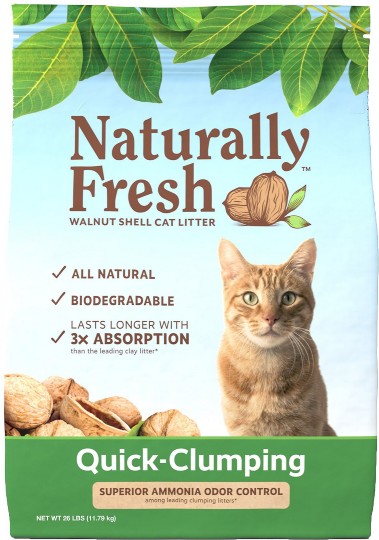
Who Makes Blue Buffalo and Where Is it Produced?
You commonly see the General Mills label on cereal boxes at your local supermarket, but they’re responsible for more than just groceries. In 2018, General Mills bought Blue Buffalo for $8 billion. One year prior, in 2017, Blue Buffalo had brought in a total of $1.275 billion in sales.
Blue Buffalo is primarily a pet food brand. Their focus is on creating natural, healthy pet food for dogs and cats. They make many different types of pet food, including wet food, dry kibble, and treats. As many Americans turn away from over-processed foods, Blue Buffalo has surged in popularity as a healthier alternative, and now, they’ve moved into the cat litter market as well with Naturally Fresh.
The headquarters for Blue Buffalo is located in Wilton, Connecticut. They also have a new $200 million manufacturing facility that’s located in Richmond, Indiana, that’s capable of producing a staggering 1 million pounds of pet food each day. Originally founded in 2003, Blue Buffalo is an American company that sources the vast majority of its ingredients from the USA.
Which Types of Pets Is Blue Buffalo Best Suited For?
Touted as a health-focused brand featuring natural recipes with top-quality ingredients, Blue Buffalo is the brand that many turn to when they lose faith in cheaply-produced commercial pet products. Thanks to their health-boosting ingredients and recipes, Blue Buffalo products are suitable for just about any dog or cat. Granted, they’re a bit pricier than the most mainstream brands you’ll find alongside them at large box stores, but you’re getting a higher-quality product that you can trust to be safe and healthy for your beloved pets.
Which Types of Pets Might Do Better with a Different Brand?
In general, any healthy pet will do well on Blue Buffalo products. But pets that have pre-existing conditions and need very specific care might do well on a brand that’s formulated specifically for pets with illnesses and diseases. Also, due to the higher cost of Blue Buffalo products compared to other large commercial brands, low-income families may benefit more from a cheaper alternative.
With Blue Buffalo cat litter specifically, cats that develop allergies towards walnuts might need to switch to another brand that utilizes clay instead. This is a rare happening, especially because this litter is unscented and low in dust.
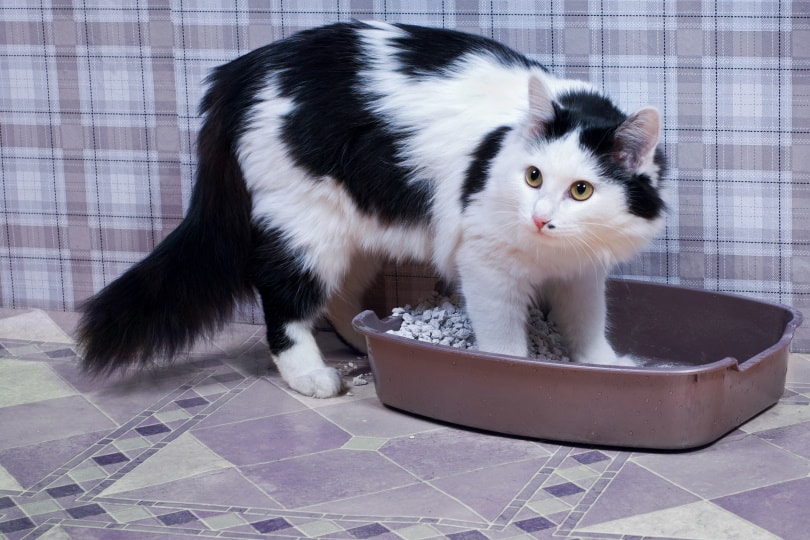
Discussion of the Primary Features (Good and Bad)
To get a good sense of what Blue Buffalo cat litter offers, we need to take a closer look at its primary ingredients, features, and claims. We will see how their litter lives up to their advertising, and while we’re at it, we’ll address any flaws or downsides that we’ve found.
Walnut Rather Than Clay
One of the big draws of this cat litter is that it’s made from walnut. It’s entirely natural, biodegradable, and even flushable because of this. Many people have switched to this cat litter simply because they can flush it, which is valuable in places that have banned plastic bags. Of course, not every jurisdiction allows you to flush cat litter, so you’ll need to check with local regulations before flushing it down the drain!
Is It Low Tracking & Low Dust?
Two of the major claims made about Naturally Fresh cat litter are that it’s low dust and low tracking. In our experience, this litter is accompanied by a similar amount of dust to any standard clay cat litter we’ve used. It’s also not much better when it comes to tracking. Though Naturally Fresh claims their litter doesn’t track as much as clay, we haven’t seen this to be true. Clay litter tends to be much heavier, so it doesn’t stick to cats’ feet as much.
100% Natural
If you’re concerned about the health and well-being of your cat, then you’re probably drawn to the all-natural label of Naturally Fresh cat litter. There are no chemical additives or clumping agents added to this litter. It’s just ground-up walnut shells, which are highly absorbent and great for reducing odor. Plus, you don’t have to worry about the effect it has on the environment when you throw it out since it’s entirely safe for the environment.
An Expensive Alternative
Naturally Fresh cat litter is considered a premium cat litter, which means that it comes with a premium price tag. If you’re on a budget, then you might want to skip right over this brand for your litter. Compared to other brands that sell affordable clay litter, Naturally Fresh can cost several times more.
A Quick Look at Blue Buffalo Cat Litter
- Made from all-natural ingredients
- Biodegradable formula
- Made from walnut shells
- Multiple formulas to choose from
- It’s flushable
- More expensive than alternatives
Recall History
Blue Buffalo has had several recalls throughout the years, all of which are regarding their pet foods. However, Naturally Fresh cat litter, which is produced and sold by Blue Buffalo, has never been recalled.
Reviews of the 3 Best Blue Buffalo Cat Litter Recipes
1. Naturally Fresh Unscented Quick-Clumping Walnut Cat Litter
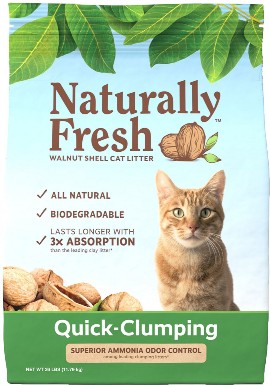
Our favorite of the Blue Buffalo Naturally Fresh litters is the quick-clumping formula. It clumps in as little as 15 minutes when it gets wet! You’ll notice that it’s a bit cheaper than other litters from the same brand, offering a slightly better value in our opinion.
This formula is devoid of silica dust, though there’s still plenty of red dust; about the same amount as we get with most clay cat litter. It produces a woody scent, which is entirely from the walnuts as there’s no added perfume in this litter. It’s more absorbent than clay litters and doesn’t track as much as other walnut litters, which is why we prefer this formula to the others offered by Naturally Fresh.
- Quick-clumping formula clumps in just 15 minutes
- Slightly cheaper than other Naturally Fresh litters
- Contains no silica dust
- No added perfume
- Still has plenty of red dust
2. Naturally Fresh Multi-Cat Fresh Unscented Clumping Walnut Cat Litter
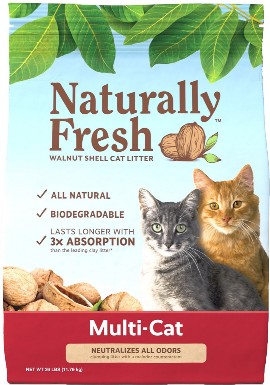
Homes with multiple cats have very specific needs, and the Naturally Fresh multi-cat fresh unscented clumping walnut cat litter was built to meet those exact needs. It contains a proprietary malodor counteractant that’s intended to rid your home of odors related to the litter box, including both urine and feces smell.
Like other Naturally Fresh cat litter, this formula is all-natural and biodegradable. It’s also devoid of chemicals, toxins, clay, corn, and grains, so it’s entirely safe and healthy for your felines.
We weren’t thrilled with how dusty this litter was. It’s a bit dustier than other litters from Naturally Fresh, though only on par with the dust created by most clay cat litters. You will have to pay a bit more for this formula though; it’s far pricier than standard clay litters.
- Great for multi-cat homes
- All-natural and biodegradable
- Free of chemicals, toxins, clay, corn, and grains
- Pricier than products from other brands
- Contains more dust than expected
3. Naturally Fresh Ultra Odor Control Unscented Clumping Walnut Cat Litter
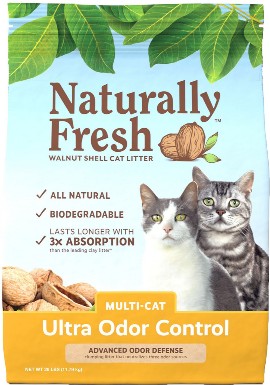
Tired of the constant foul odors in your home from your cat’s litter box? Then this is the formula for you. It’s the ultra odor control formula, meant to tame even the wildest odors. Granted, it’s one of the most expensive cat litters from Naturally Fresh, which makes it far pricier than most clay cat litters.
This litter manages to neutralize even the strongest of odors thanks to the moisture-activated probiotic that’s added into it. It starts working when it gets wet, immediately putting an end to fecal, urine, and ammonia odors.
Since it’s free of chemicals, toxins, and clay, you can rest assured that this cat litter is completely safe for your furry friend. It doesn’t track as much as some other blends, though it’s still pretty close to clay cat litter in terms of mess.
- Excellent at controlling odors
- Contains a moisture-activated probiotic
- No chemicals, toxins, or clay
- It’s more expensive than other Naturally Fresh litters
What Other Users Are Saying
We’ve taken a lot of time to research and test the Blue Buffalo Naturally Fresh cat litter, but we also realize that our opinions aren’t the only ones that matter. So, in an effort to bring you a conclusive picture, we’ve summarized other real user experiences on Chewy and Amazon, hoping that they will provide you with more insight into how real-world users feel about this cat litter.
Chewy
With an 88% positive rating, this cat litter has quite a good following on Chewy. Most users say that it has low to no tracking and makes cleaning up a breeze. There’s also a general conclusion that cats seem to like it, especially those that previously disliked relieving themselves in their litter boxes. However, the outliers noted that it leaves a lot of dust around the whole house.
If you want to read more of the reviews on Chewy, follow this link.
Amazon
Most users love it and say that it has virtually no scent of any kind, even for those cat owners with more than a dozen felines! However, unhappy customers cited a massive amount of dust as their main gripe.
To read more of these reviews, click here.
Conclusion
Not everyone was thrilled about their experience with Naturally Fresh cat litter from Blue Buffalo, though a majority of users were. Overall, we think it’s a great cat litter and definitely a healthier alternative to clay formulas. While it still creates nearly as much dust as clay cat litter, some of the Naturally Fresh formulas don’t track nearly as much.
We love that these cat litters are all-natural. Furthermore, it’s excellent that they’re biodegradable and eco-friendly. Even the packaging is made from recycled materials! This litter is so safe that it can even be flushed, provided that’s legal where you live. In the end, we would choose Blue Buffalo cat litter over many of the other options available since we can be certain that it’s a healthy choice for our cats.
Featured Image: Chewy/ yamamedal, Shutterstock
Contents
- Review Summary
- At a Glance: The Best Blue Buffalo Cat Litter Formulas:
- Blue Buffalo Cat Litter Reviewed
- Who Makes Blue Buffalo and Where Is it Produced?
- Which Types of Pets Is Blue Buffalo Best Suited For?
- Which Types of Pets Might Do Better with a Different Brand?
- Discussion of the Primary Features (Good and Bad)
- An Expensive Alternative
- A Quick Look at Blue Buffalo Cat Litter
- Recall History
- Reviews of the 3 Best Blue Buffalo Cat Litter Recipes
- 1. Naturally Fresh Unscented Quick-Clumping Walnut Cat Litter
- 2. Naturally Fresh Multi-Cat Fresh Unscented Clumping Walnut Cat Litter
- 3. Naturally Fresh Ultra Odor Control Unscented Clumping Walnut Cat Litter
- What Other Users Are Saying
- Conclusion

